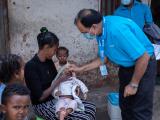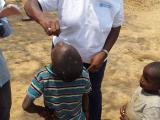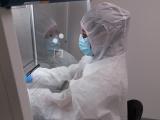Dec 15, 2011
NAS cites improvements in Boston biolab review
The National Academies of Sciences (NAS) today said the National Institutes of Health (NIH) has vastly improved its draft assessment of the risks associated with a proposed biosafety level 4 (BSL-4) lab, according to a statement. The facility, being built at the Boston University Medical Center, can handle the most dangerous pathogens. The project has raised concerns in the lab's neighborhood. In 2007, an NAS review deemed the NIH's risk assessment of the lab "not sound and credible." It faulted the agency's lack of transparency with risk assessment modeling. It also said the NIH report didn't fully address environmental justice concerns related to the inner-city location. In 2008 the NIH set up two committees to address the safety concerns. In today's statement, the NAS said the NIH had gone to great lengths to improve its draft assessment and that the report is closer to the goal of being scientifically and technically sound. The NIH
assessment, at 1,700 pages, is still in a draft form, with the next stage being its release for public comments. A letter to the NIH from the NAS includes additional suggestions for improving the final draft report.
Mar 6, 2008, CIDRAP News story
China polio toll climbs to 20
Local health officials said that polio cases in China's Xinjiang region have risen to 20, including 2 deaths, Xinhua, China's state news agency, reported yesterday. Testing for cases of acute flaccid paralysis turned up two new polio cases, according to the story. One of the cases was in a 53-year-old from Aksu prefecture who died Oct 23. The officials said the first 3 cases in the outbreak were imported and that they have classified four prefectures in Xinjiang—Hotan, Kashgar, Bayingolin, and Aksu—as epidemic zones. Xinjiang borders three of the four polio-endemic countries in the world: Afghanistan, India, and Pakistan; the other endemic country is Nigeria.
Dec 14 Xinhua article



















